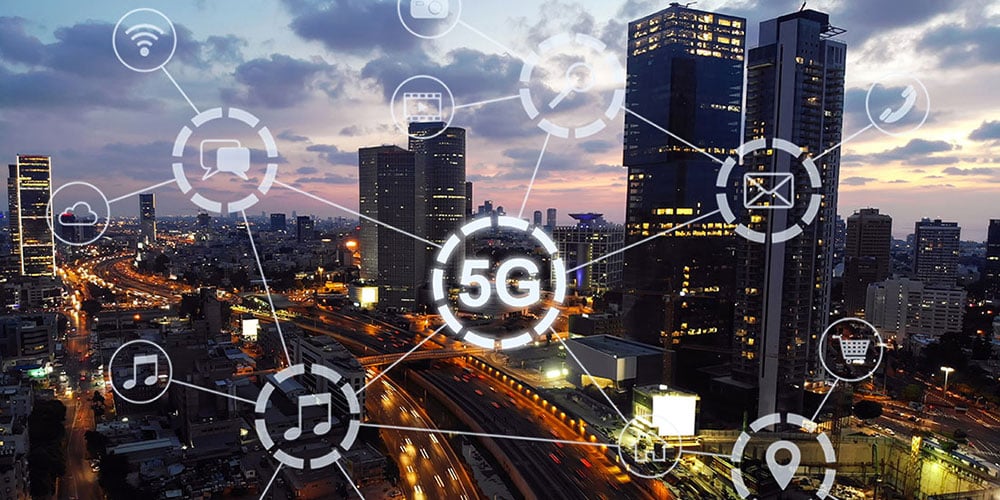In today's digitally-driven world, reliable and high-performance connectivity is crucial for businesses to operate efficiently and stay competitive. As organizations evaluate their wireless networking options, two prominent choices emerge: private 5G and enterprise Wi-Fi.
Let’s define both technologies, compare their key differences, and discuss suitable use cases to help you make an informed decision based on your operational and budgetary restrictions.
What is a Private 5G?
Private 5G networks are dedicated cellular networks that utilize the latest 5G technology to provide secure, highly reliable, and high-speed wireless connectivity within a specific area, such as a factory, campus, or office building. These networks are separate from public 5G infrastructure owned and managed by the wireless carriers which, allows businesses to have greater control over their network performance, security, and configuration.
What is Enterprise Wi-Fi?
Wi-Fi is a widely-used wireless networking technology that allows devices to connect to the internet or local area networks (LANs) over shared radio waves. Enterprise Wi-Fi networks are typically deployed using access points, which transmit and receive data from connected devices. Businesses often deploy Wi-Fi to provide internet access to employees, guests, and various IoT devices.
Key Differences Between Private 5G and Wi-Fi
To differentiate between private 5G and Wi-Fi networks, let’s review a few key performance criteria such as speed, bandwidth, latency, range, security, and scalability.
Performance and Capacity
Private 5G networks offer several performance advantages over Wi-Fi, including lower latency, higher data rates, and improved quality and service. 5G's ultra-reliable low latency communication (URLLC) capabilities make it ideal for mission-critical applications that require real-time data processing, while its enhanced Mobile Broadband (eMBB) feature supports high-bandwidth use cases.
Wi-Fi networks, although capable of delivering high-speed internet access, may face challenges in handling large numbers of devices and maintaining consistent performance across wide coverage areas.
Range and Coverage
Private 5G networks can provide better coverage over larger areas compared to Wi-Fi, as 5G signals can travel longer distances and penetrate obstacles more effectively. This makes 5G a suitable option for businesses with campuses, expansive facilities, or challenging environments.
Wi-Fi networks, on the other hand, generally have a shorter range and may require a multitude of access points or mesh systems to cover large or dense areas, which can increase complexity, risk of interference, and cost.
Security
Private 5G and Wi-Fi offer robust security features, but 5G has an edge due to its cellular architecture, SIM based authentication, and inherent security protocols. Private 5G networks utilize strong encryption, device authentication, and network slicing capabilities to protect sensitive data and prevent unauthorized access.
Modern Wi-Fi networks also employ advanced security measures like WPA3 encryption and 802.1X authentication; however, they can be potentially more vulnerable to attacks due to their widespread adoption and reliance on shared spectrum.
Deployment and Cost
Deploying a private 5G network via CBRS typically requires dedicated infrastructure, spectrum coordination via SAS, and specialized platforms, which can result in higher upfront costs compared to Wi-Fi. However, 5G's long-term benefits, such as improved performance, scalability, and security, may offset these initial investments.
Wi-Fi networks are generally easier and more affordable to deploy, as they rely on unlicensed spectrum and widely available hardware. This makes Wi-Fi a more accessible option for small businesses or organizations with limited budgets.
Notable Use Cases for Private 5G and Wi-Fi
Let’s take a closer look at the optimal use cases for each networking solution.
Private 5G Network Use Cases
Private 5G networks are ideal for organizations that require speed, reliability, and low latency. They are a suitable networking solution for business-critical applications such as:
- Large Venues and Campuses - Stadiums, arenas, and university campuses can deploy private 5G networks to deliver improved wireless connectivity for attendees, students, and staff, as well as flexible and dynamic deployment of sensors, cameras, and other IoT assets based on the needs of the facility.
- Industrial IoT and Automation - Factories and manufacturing plants can benefit from private 5G networks to support real-time monitoring, robotics, and automation systems that require low-latency and reliable connectivity.
- Public Safety and Emergency Services - Private 5G networks can be used by first responders and emergency services to establish secure and reliable communication during disaster response, search and rescue operations, or large-scale public events.
Wi-Fi Network Use Cases
Wi-Fi is the most convenient connectivity medium for non-mission-critical environments, from office spaces to coffee shops. And with the rise of Wi-Fi 6 technology, businesses can now transmit data more rapidly, securely, and efficiently than ever before, opening up new possibilities for seamless connection experiences. Here are a few use cases for enterprise Wi-Fi:
- Office Environments - Wi-Fi is a popular choice for office settings, providing internet access for employees and guests, and supporting video conferencing instead of the business critical applications that are best suited for 5G including connecting various IoT devices, cameras, business critical applications, and enhanced-security slices of the network.
- Retail and Hospitality - Wi-Fi networks can be deployed in retail stores, restaurants, and hotels to offer guest access, and enable location-based services, whereas 5G is best suited to support back of house, business critical functions, and point of sale where security and speed are of the essence.
- Small Businesses - Due to its lower upfront costs and ease of deployment, Wi-Fi is an attractive option for small businesses that require reliable internet access without the need for advanced features.
Choosing a Suitable Networking Solution for Your Business
Choosing the best wireless solution for your use cases between private 5G and Wi-Fi ultimately depends on your specific business requirements, budget, and long-term objectives. Private 5G networks are well-suited for organizations with mission-critical applications, large coverage areas, dynamic deployments, or demanding performance needs, while Wi-Fi networks offer a more accessible and cost-effective solution for smaller businesses and general-purpose connectivity.
By understanding the strengths and limitations of each technology, you can make an informed decision and invest in the right connectivity solution to drive your business forward.
However, designing a communication network is a complex and daunting endeavor. If you lack the necessary resources in-house, it’s imperative to seek out an experienced managed service provider who can provide guidance throughout the deployment process.





